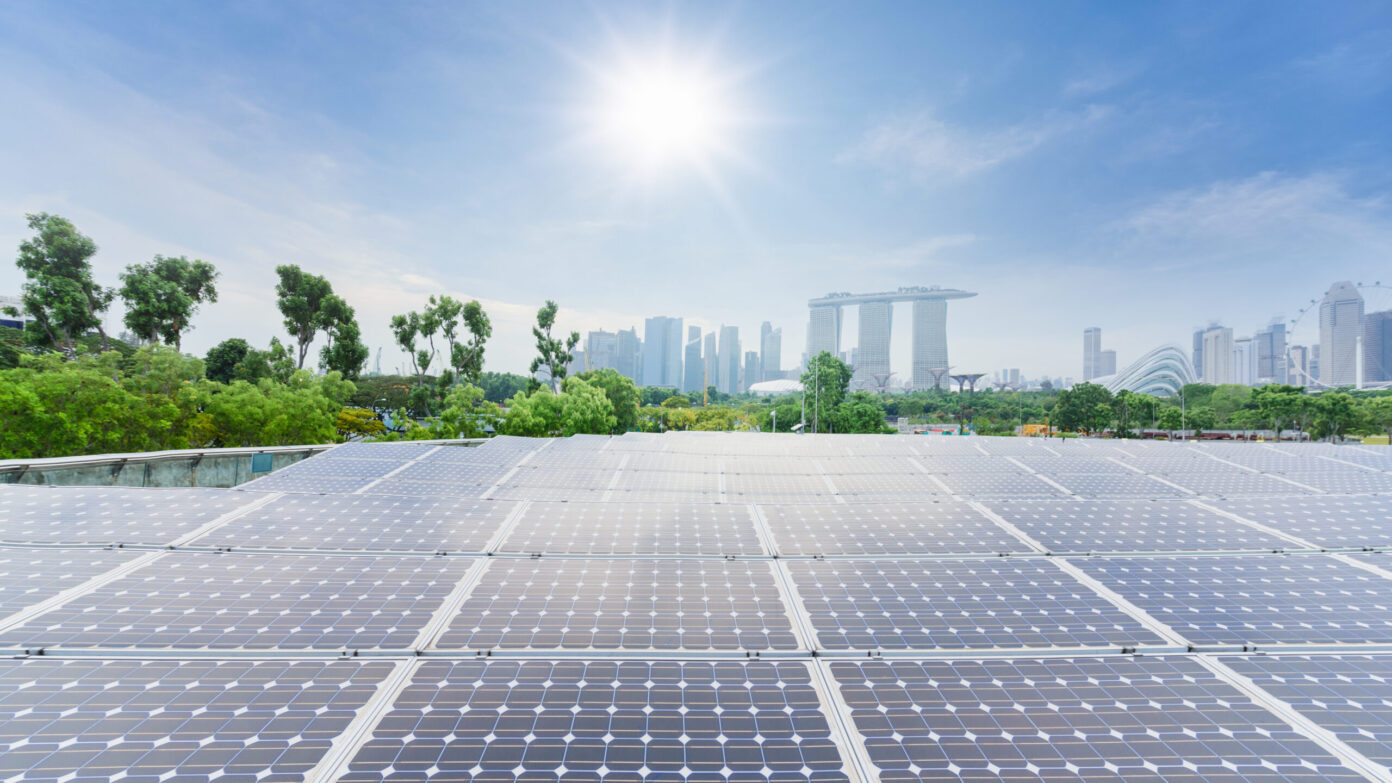Innovation and collaboration power Singapore’s renewable energy ambitions


Singapore has outlined an ambitious plan to boost its renewable energy capacity as it looks to achieve the nation’s net-zero targets.1 The city state is on a journey to decarbonise its energy sector and has set a deadline of 2050 for the industry to reach carbon neutrality.2 This is a pattern that is being repeated across ASEAN as countries set in train plans to reduce carbon emissions and increase their production of renewable energy. For example, Indonesia plans to meet 85 per cent of its energy needs from renewable sources by 20603 while Vietnam aims to double its installed wind and solar power generation capacity to 31-38 gigawatts in less than a decade.4
However, unlike other ASEAN countries, Singapore faces some particular obstacles in trying to increase its renewable energy capacity. While the city receives plenty of sunshine, it lacks the space to build large solar energy fields.5 What’s more, Singapore’s average wind speed of two metres per second (m/s) is less than the minimum of 4.5 m/s needed to operate wind turbines and it lacks a river system that could harness hydroelectric power.6
Yet as we know, Singapore is a city of innovation and to overcome these limitations it has launched a scheme that will see it work with other ASEAN countries to produce and import low-carbon energy into the country to supplement its existing natural gas power generation capacity.
Through the scheme, Singapore has set a target of 2035 to import around 30 per cent of its electricity from low carbon sources.7 The process began in November last year when it launched a tender process for the import of 1.2 gigawatts (GW) of low-carbon electricity.8 A second request for proposal will be launched later this year for an additional 2.8GW of electricity.9
From Standard Chartered’s conversations with clients, we understand the scheme is attracting attention from various consortiums in ASEAN and globally who are interested in bidding for this opportunity. Most of these consortiums are looking to build solar energy fields off the shore of Indonesian islands situated near Singapore, and use a subsea transmission cable to bring energy into the city state.
While technically feasible, these projects face multiple execution challenges that need careful consideration to ensure the ventures can raise the billions of dollars in financing required to support such developments. Standard Chartered estimates the first phase of the scheme alone will need in excess of SGD15 billion of funding through debt and equity.
Some of the key aspects to review include procuring access to sites in Indonesia, G-to-G understanding and agreements between the two countries, increasing costs due to supply chain issues and commodity price inflation, and the challenges of laying subsea cables in multijurisdictional waters, among others.
In addition, Singapore’s power market is a liberalised market which means the government does not control the price or purchase of energy. Instead, generation companies compete to supply power through the wholesale electricity market to sell to consumers through licensed retailers. For consortiums looking to take part in the energy import scheme the consequence of this electricity market structure means they can’t rely on the government backed long-term Power Purchase Agreements (PPAs) prevalent in most other countries in the region.
With certainty of revenue likely to be a key concern for potential financial backers, consortiums will instead need to sign long-term ‘offtake’ agreements with private companies. And it will be critical for these offtakers to be creditworthy counterparties. These counterparties could include existing power retailers or large energy consumers with ambitions to lower their carbon footprint such as the users of data centres like the big technology companies.
Thanks to its strong history of innovation and its leading commitment to tackling climate change, Singapore has designed a ground-breaking solution to the challenges it faces in boosting renewable energy capacity. However, given the large capital outlay involved with the scheme, financing will be a critical factor and to succeed, interested parties need to work with financial institutions that are ambitious about their own net-zero plans. For example, Standard Chartered has announced new targets to reach net-zero carbon emissions from its financed activity by 2050 and plans to mobilise USD300 billion in green and transition finance by 2030.
With strong local presence in the ASEAN markets, a deep understanding of capital markets as well as proven ability to structure and finance such large green energy projects, the bank is well placed to assist consortiums on this scheme, thereby helping secure Singapore’s green energy future and create a more sustainable world.
The writer is Regional Co-head, Project & Export Finance, ASEAN and Australia, Standard Chartered Bank
5 https://www.nccs.gov.sg/singapores-climate-action/singapore-approach-to-alternative-energy/
6 https://www.nccs.gov.sg/singapores-climate-action/singapore-approach-to-alternative-energy/
8 https://www.ema.gov.sg/electricity-imports-rfp1.aspx
9 https://www.ema.gov.sg/electricity-imports-rfp2.aspx